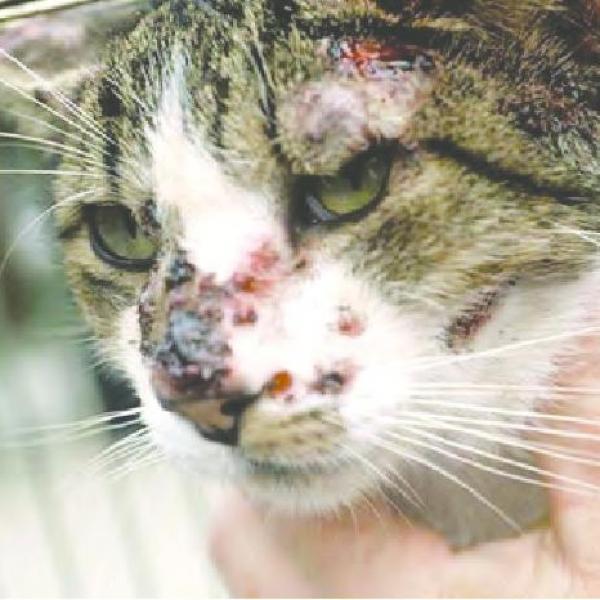Sporotrichosis is a zoonotic disease, a disease that can be transmitted from animals to humans. The agent of this disease is a fungus, which usually uses a sore on the skin as an ideal way to enter the body.
This terrible disease can affect many animals, including dogs and cats! Since it can be passed on to humans, it is essential to be careful. For this reason, Animal Expert wrote this article with everything you need to know about sporotrichosis in dogs and cats: symptoms, causes and treatment.
- Sporotrichosis.
- Also known as rose disease.
- Is caused by the fungus Sporotrix Schenkii.
- This fungus is found everywhere in nature.
- So it is not difficult for your pet to come into contact with it.
- Especially cats that have access to the outside.
- Can come into contact with this fungus on the ground and in the gardens they frequent.
This fungus especially likes warm, humid places to breed and that’s why it’s more common in tropical climates. The best way to prevent the appearance of this fungus is to always keep the places clean, especially the cat litter!
É importante referir que, segundo alguns estudos, a transmissão a partir dos gatos para os humanos é mais comum do que a partir dos cachorros. Por vezes, o animal pode não ter a doença mas ser portador do fungo. Por exemplo, se o seu gatinho esteve em contacto direto com este fungo na rua e numa brincadeira lhe fizer um arranhão, pode ser o suficiente para o contaminar. Desinfete rapidamente a ferida!
In dogs, sporotrichosis is considered rare. It is more common to have dermatophytosis caused by other agents, such as Microsporum canis, Microsporum gypseum and Trichophyton mentagrophytes. Anyway, there are some reported cases and therefore there is little attention. As for cats, hygiene is the most important thing of all, both to keep your dog salty from these opportunistic mushrooms, like you.
As mentioned above, what causes sporotrichosis is the fungus Sporotrix Schenckii, which normally uses small lesions or sores to enter the animal’s body.
There are three types of sporotricosis
Unlike other skin conditions, injuries caused by sporotrichosis usually do not cause itching. In addition to the typical symptoms listed below, animals may lose their appetite and, consequently, weight.
In addition, when the disease spreads, other clinical signs may appear, depending on the affected systems. Respiratory, musculoskeletal and even gastrointestinal problems.
Diagnostic tests by the veterinarian are needed to confirm that the animal suffers from sporotrichosis. This disease can be easily confused with others that have similar clinical signs, such as leishmaniasis, herpes, etc.
These are the most common ways to diagnose
Sometimes a fungal culture and biopsy may be necessary. Also, don’t be surprised if your veterinarian has to perform several tests on your pet. Complementary tests are of paramount importance in ruling out possible differential diagnoses and, remember, without a correct diagnosis, the chances of effective treatment are much lower.
The treatment of choice for this problem is sodium iodide and potassium.
In the case of cats, the veterinarian will pay special attention as there is an increased risk of ioidism as a side effect of this treatment, and the cat may have:
Other medications may be used to help heal injuries, such as imidazole and triazoles. It is important to note that using these medications may also have side effects such as:
If your pet has any side effects of the medicine, you should contact the veterinarian who is monitoring the case immediately.
Yes, sporotrichosis is curable. To do this, you should take your pet to the veterinary clinic as soon as you check some of the symptoms mentioned above. The sooner treatment is started, the better the prognosis.
The prognosis of this disease is good if it is identified early and treated appropriately. Relapses may be available, but they are usually associated with drug abuse. Therefore, we emphasize once again that you should never take care of your pet without the supervision of the veterinarian, since this act may seem to solve the problem for the time being but worsens the health of your pet in the future.
This article is for informational purposes only, in Animal Expert.com.br we cannot prescribe veterinary treatments or make any kind of diagnosis. We suggest that you take your pet to the veterinarian in case of any type of condition or discomfort.
If you want to read articles similar to sporotrichosis in dogs and cats: symptoms, causes and treatment, we recommend that you visit our Skin Problems section.

